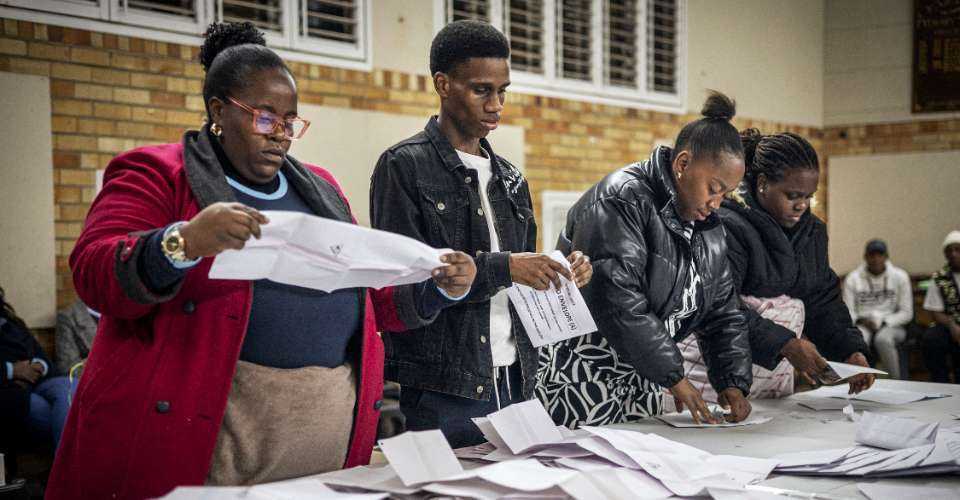
Independent Electoral Commission (IEC) count ballots at the Craighall Primary School polling station in Johannesburg on May 29 during South Africa’s general election. (Photo: AFP)
Catholic leaders in South Africa praised the good turnout, as voting wrapped up on May 29 in Africa's southernmost country.
Thousands of men, women and youth trooped to polling stations to cast ballots in one of the most pivotal general elections since the end of apartheid in 1994.
"The voter turnout is much higher than many people had anticipated," Peter Knox, a theologian at the Jesuit Institute of South Africa told OSV News in a telephone interview on May 29 as people were still voting, with many of the polling stations so packed that the voters had to wait three to four hours.
"People are saying: it's not voter apathy this year," Knox said.
"The large turnout means the people have really invested in this election and in this process. It's very good for the country that eventually the government that comes out will be a government supported by the majority of the people," the expert said.
"People will be able to say: I voted and this government represents me," he added.
More than 27 million people registered as voters in the polls, with a record of 70 parties and 11 independent candidates contesting. South Africans are voting to elect a new parliament and nine provincial legislatures.
The African National Congress -- the party of Nelson Mandela, the father of the modern South African nation -- has swept into power in the last 30 years.
Partial results in South Africa's national election put the long-ruling ANC at below 50 percent of the vote as counting continued on May 30, raising the possibility that it might lose its majority for the first time since it swept to power under Nelson Mandela at the end of apartheid in 1994, The Associated Press reported.
"It is a significant election for the whole country. For the first time in our 30 years of our universal democracy, the ANC is under threat of losing the 50 percent majority," Knox said.
Catholic bishops in the country urged free and fair elections ahead of the polls, and the choice of leaders who prioritize ethical and moral values.
Knox said the bishops have been working with agencies and groups like the Jesuit institute on voter education across the country.
"We have the sense it's going to be free, fair and transparent," Knox said, highlighting the church's efforts.
Days prior to the elections, Bishop João Noé Rodrigues of Tzaneen, South Africa, said the highly-contested general elections were important because they give "the people of South Africa the opportunity to take a critical look at how far we've gone, what we've done well, where we've lost it and what it is that we can do, so this election therefore allows us to be able to correct that," said Bishop Rodrigues, the liaison for social action in the Southern African Catholic Bishops' Conference.
Before the elections, the killing of three priests was linked to the rising crime and violence in the country. A lone gunman shot Father William Banda, a young Zambian missionary, as he prepared to celebrate mass in the Holy Trinity Cathedral in the diocese of Tzaneen on March 13.
The murder of the 37-year-old Catholic priest followed that of three Orthodox priests, who were murdered on March 12 in St. Mark and St. Samuel the Confessor Monastery, in Cullinan, a small town in Gauteng province, about 18 miles east of the capital, Pretoria.
One of the murdered priests was Father Takla Moussa, assistant bishop and abbot of St. Mark and St. Samuel the Confessor Monastery. The other two were identified as Fathers Minah ava Marcus and Youstos ava Marcus. Investigators arrested an Egyptian member of the church as a suspect.
In a recent video posted on Facebook, Archbishop Buti Joseph Tlhagale of Johannesburg said there is a lot of anger below the surface; the people are feeling frustrated that many of the communities have not experienced any material changes in their lives since 1994.
He described the anger as a "crisis situation," while highlighting the bishops' desire to raise the issues so that the "political leadership becomes aware … also to lift the spirit of the people so that they will not lose hope because of these challenges," Archbishop Tlhagale said.
In February, the bishops conference urged the people to vote according to their experience and conscience.


